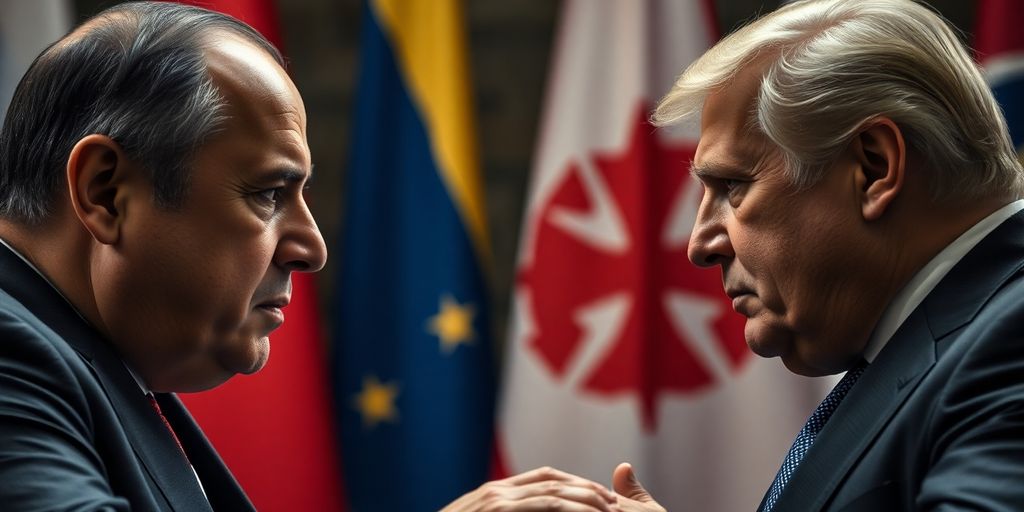The global geopolitical crisis is shaking up how the big players on the world stage interact. It’s like a giant chess game where every move can change the whole board. From economic impacts to military tensions, and even the role of technology, these dynamics are complex. This article breaks down how these factors are reshaping relationships between the world’s major powers.
Key Takeaways
- Global geopolitical crises often reshape international relations, causing shifts in alliances and rivalries.
- Economic impacts are significant, with trade disruptions and market instability affecting countries worldwide.
- Military tensions are rising as nations adjust their defense strategies and form new alliances.
- Diplomatic efforts are ongoing, but peace initiatives face many challenges in the current climate.
- Technology plays a dual role, offering new tools for conflict and cooperation, while cybersecurity threats loom large.
The Historical Context of Global Geopolitical Crises

Major Events Shaping Current Dynamics
The world has seen its fair share of geopolitical crises over the centuries. These events have dramatically shaped the way nations interact today. From the rise and fall of empires to the formation of modern nation-states, history is riddled with pivotal moments. Consider the impact of the World Wars, which not only redrew borders but also shifted power balances on a global scale. The Cold War further polarized the world into two distinct blocs, influencing international relations even now.
Lessons from Past Geopolitical Tensions
Reflecting on past geopolitical tensions offers valuable insights. History teaches us about the dangers of unchecked aggression and the importance of diplomacy. For instance, the Cuban Missile Crisis highlighted how close the world came to nuclear conflict, emphasizing the need for effective communication channels between adversaries.
- The Treaty of Westphalia in 1648 marked the end of religious wars in Europe and the beginning of the state system.
- The Congress of Vienna in 1815 aimed to restore order after the Napoleonic Wars.
- The formation of the United Nations in 1945 was a direct response to the devastation of World War II, aiming to prevent future global conflicts.
Influence of Historical Alliances
Alliances have always played a critical role in shaping geopolitical landscapes. The timeline of geopolitical changes from 1500 to the present shows how alliances have influenced national borders and political landscapes. The NATO alliance, for example, was formed in response to the Soviet threat and continues to be a cornerstone of Western military strategy. Similarly, the Warsaw Pact was a significant counterbalance during the Cold War era.
Understanding the historical context of global geopolitical crises helps us appreciate the complexities of current international relations. It reminds us that today’s dynamics are often rooted in yesterday’s events, and learning from the past is crucial for navigating the future.
Economic Impacts of the Global Geopolitical Crisis
Trade Disruptions and Economic Shifts
Global geopolitical crises often lead to significant trade disruptions. When tensions rise, countries may impose trade barriers, tariffs, or even embargoes. This can lead to a domino effect, impacting supply chains worldwide. Supply chain disruptions can cause delays and increase costs for businesses, leading to higher prices for consumers.
- Export restrictions can limit the availability of essential goods.
- Import tariffs can increase the cost of raw materials.
- Trade routes may be altered, affecting delivery times.
Impact on Global Markets and Investments
The stock market is highly sensitive to geopolitical tensions. Investors tend to react quickly to news, causing volatility. During crises, there might be a shift from riskier assets to safer ones like gold or government bonds. This shift can lead to fluctuations in stock prices, affecting both large and small investors.
- Stock market volatility can lead to losses for investors.
- Safe-haven assets like gold may see increased demand.
- Currency values can fluctuate, impacting international trade.
The Role of Sanctions and Economic Policies
Sanctions are a common tool used by countries to exert pressure without resorting to military action. These can have wide-ranging effects on the target nation’s economy, as well as on global markets. Sanctions can lead to shortages of goods, inflation, and even recession in the affected country. They can also impact countries that trade with the sanctioned nation.
Economic policies during geopolitical crises are crucial. Policymakers must balance between maintaining economic stability and addressing the geopolitical challenges. This often involves difficult decisions that can have long-term effects on the global economy.
In summary, the conflict’s impact on markets is closely tied to its proximity to production facilities, particularly in agriculture and energy sectors, highlighting the significance of geographical factors in economic consequences.
Military Tensions and Strategic Alliances
The Rise of New Military Powers
In recent years, we’ve seen some countries rapidly boost their military capabilities. Nations like China and India are pouring resources into developing advanced weapons systems, while others focus on cyber warfare. This shift is changing the global military landscape, creating new power dynamics. As these countries grow their influence, traditional powers like the U.S. and Russia must rethink their strategies to maintain dominance.
Shifts in Defense Strategies
Countries are re-evaluating their defense strategies to adapt to new threats. This means investing in cutting-edge technology and modernizing their forces. For instance, there’s a push towards:
- Enhancing cyber defense capabilities
- Developing unmanned systems like drones
- Strengthening missile defense systems
These changes are not just about keeping up with rivals but also about preparing for future conflicts that might look very different from past wars.
The Role of International Military Alliances
International alliances, such as NATO, play a crucial role in maintaining global security. They provide a platform for countries to collaborate on defense initiatives and share intelligence. NATO, for instance, is focusing on fortifying its defenses in preparation for future conflicts, emphasizing the necessity for member countries to define and increase their defense spending. These alliances also help deter potential aggressors by showcasing a united front.
As military tensions rise, the importance of strategic alliances becomes more apparent. They are not just about defense but also about fostering diplomatic ties that can prevent conflicts before they start.
Diplomatic Efforts and Peace Initiatives
Key Diplomatic Players and Their Roles
In today’s complex world, diplomacy is like a giant jigsaw puzzle. Countries, big and small, play their part, trying to piece together a picture of peace. The United Nations often takes center stage, acting as a mediator in global disputes. Other key players include regional organizations like the European Union and ASEAN, which bring neighboring countries together to discuss and resolve issues. Individual countries also step up, with nations like Switzerland and Norway often acting as neutral grounds for peace talks.
Challenges in Peace Negotiations
Peace talks aren’t easy. They can drag on for years, sometimes without any real progress. One major hurdle is getting all parties to agree on basic terms. Each side usually has its own demands and red lines. Mistrust between conflicting parties can stall negotiations, making it tough to reach any consensus. External influences, like pressure from allied nations or international sanctions, can also complicate things further.
Success Stories in Conflict Resolution
Despite the challenges, there have been notable successes in peace efforts. The Good Friday Agreement in Northern Ireland is a prime example of how persistent diplomacy can lead to lasting peace. Similarly, the Camp David Accords brought Egypt and Israel to the negotiating table, resulting in a peace treaty that still holds today. These examples show that while peace talks can be tough, they can also lead to meaningful change.
Diplomacy isn’t just about ending conflicts. It’s about rebuilding trust and creating a foundation for future cooperation. The World Economic Forum’s Annual Meeting 2025 in Davos, for instance, emphasizes ‘Rebuilding Trust’ as a central theme in addressing geopolitics, conflict, and diplomacy. Rebuilding Trust is crucial in navigating the complexities of global relations.
The Role of Technology in Geopolitical Dynamics

Cybersecurity Threats and Responses
In today’s world, cybersecurity is a big deal. Every country is on edge, trying to protect its data and systems from hackers and cyber-attacks. The stakes are high, as a single breach can mess up a nation’s economy, politics, or even its military. Countries are investing tons of money into cybersecurity, creating teams that are always on the lookout for threats. Some governments even work together to share info and fight off cyber threats as a team.
Technological Advancements in Warfare
Remember when wars were fought with just guns and tanks? Now, it’s all about drones, AI, and advanced tech. Nations are racing to create the best gadgets and systems to outsmart each other. Drones fly over enemy lines, gathering intel without risking lives. AI helps in planning and executing strategies faster than humans ever could. It’s a tech arms race, and everyone wants to be on top.
The Influence of Social Media on Public Perception
Social media isn’t just for sharing cat videos anymore. It’s a battlefield of ideas and opinions. Governments use platforms like Twitter and Facebook to sway public opinion, both at home and abroad. Sometimes, they spread fake news or propaganda to confuse or mislead people. It’s like a modern-day information war, where the side with the best story wins. The public’s perception can change in an instant, and leaders know how to use that to their advantage.
Technology is reshaping the geopolitical landscape, making it more complex and interconnected than ever before. As nations grapple with these changes, the balance of power is constantly shifting, influenced by innovations in tech and the digital world.
Organizations must integrate geopolitics and technology into risk management, evaluating how regulatory changes and cyber threats impact their strategies in this fast-paced global environment.
Environmental Factors Influencing Geopolitical Stability
Resource Scarcity and Territorial Disputes
Resource scarcity is a big deal in global politics. When countries don’t have enough water, oil, or minerals, they start looking at their neighbors’ resources. This can lead to territorial disputes. Countries may fight over borders or access to these resources, causing tensions to rise. For example, water scarcity in some regions has led to conflicts over river access, impacting millions of lives.
- Limited freshwater sources can lead to disputes between countries sharing river basins.
- Oil and gas reserves often become focal points for territorial claims.
- Rare minerals, essential for tech industries, are increasingly contested.
Climate Change as a Geopolitical Catalyst
Climate change isn’t just about melting ice caps. It’s changing the way countries interact. Rising sea levels, more frequent storms, and changing weather patterns force countries to adapt quickly. This adaptation can strain resources and lead to geopolitical shifts.
As nations grapple with climate change, they may find themselves forming new alliances or facing new rivalries. The pressure to adapt can lead to cooperation, but it can also spark competition for dwindling resources.
International Cooperation on Environmental Issues
The environment doesn’t care about borders, so countries need to work together. International cooperation is key to tackling global environmental challenges. From climate agreements to pollution controls, nations are finding ways to collaborate.
- Joint efforts in reducing carbon emissions can help slow down global warming.
- Shared technology and knowledge can improve sustainable practices.
- Multinational agreements help manage shared resources like oceans and forests.
In conclusion, environmental factors are reshaping geopolitical landscapes. As nations navigate these challenges, the need for sustainable practices becomes even more pressing. Without cooperation and careful management, the world could face increased instability and conflict.
Cultural and Ideological Conflicts
The Clash of Ideologies in Global Politics
In today’s world, different ideologies often clash, creating tension between nations. Political extremism has been on the rise, with roots deeply embedded in history. This trend might shift as future generations redefine their beliefs in response to global challenges. Here are some key aspects of these ideological battles:
- Nationalism vs. Globalism: While some countries push for national interests, others advocate for global cooperation.
- Democracy vs. Authoritarianism: The debate continues over which system best serves the people.
- Secularism vs. Religious Governance: Different countries struggle to balance religious influence in politics.
Cultural Influences on Diplomatic Relations
Cultural differences can impact how countries interact on the global stage. Misunderstandings often arise from:
- Language Barriers: Nuances in language can lead to misinterpretations.
- Historical Grievances: Past conflicts can color current relations.
- Social Norms: What is acceptable in one culture may be offensive in another.
Diplomacy is not just about negotiations; it’s about understanding and respecting cultural differences to foster better relations.
The Impact of Nationalism and Populism
Nationalism and populism have gained momentum, influencing political landscapes worldwide. These movements often:
- Prioritize domestic issues over international cooperation.
- Promote a sense of identity and pride among citizens.
- Challenge existing political structures, leading to shifts in power.
The rise of these ideologies highlights the need for a balanced approach to global governance. As countries navigate these complex dynamics, the potential for future generations to redefine ideologies becomes ever more significant.
Future Scenarios in Global Geopolitical Relations
Predictions for Emerging Geopolitical Trends
The future of global geopolitics is a complex web of possibilities. One major trend is the shift towards regional powerhouses asserting more influence. Countries like India and Brazil are stepping up, challenging the traditional dominance of the US and China. This shift could lead to a more multipolar world where power is more evenly distributed.
- Regional alliances may become more significant, reducing the influence of traditional Western powers.
- Economic sovereignty will likely gain traction, with countries focusing more on self-reliance.
- Geopolitical risk is expected to stay high due to economic sovereignty and global rivalries, necessitating strategies to manage uncertainty for business growth.
Potential for New Alliances and Rivalries
As the global landscape evolves, new alliances will form while old ones may dissolve. Nations might seek partnerships based on shared interests rather than historical ties.
- Emerging economies could band together to create a new bloc, challenging the established order.
- Traditional alliances like NATO might face internal strains as member countries reassess their roles.
- Rivalries could intensify in regions rich in resources, leading to heightened tensions.
Long-term Implications for Global Stability
The shifting dynamics in global relations will have profound implications for international stability. As new powers rise, the potential for conflicts may increase, but so too does the opportunity for cooperation.
The future of global stability hinges on how well countries can adapt to these changes. Balancing national interests with global responsibilities will be key in maintaining peace and progress.
In conclusion, the future of geopolitics is marked by uncertainty and change. Countries must navigate these challenges carefully to ensure a stable and prosperous world.
Conclusion
In the end, the global geopolitical crisis is like a tangled web, pulling at the threads of international relationships. The big players on the world stage are finding it tough to keep things smooth. It’s like a game of chess where every move counts, and sometimes, it feels like nobody knows the rules. Countries are trying to figure out how to work together, but it’s not always easy. There’s a lot of talking, a lot of meetings, and sometimes, it seems like nothing really changes. But even in the middle of all this chaos, there’s a chance for new partnerships and ideas to pop up. It’s a tricky time, but maybe, just maybe, something good can come out of it all.
Frequently Asked Questions
What is a geopolitical crisis?
A geopolitical crisis happens when countries face big problems or disagreements that affect their relationships. It can involve politics, economics, or military issues.
How do geopolitical crises affect the world economy?
Geopolitical crises can make trade harder and affect markets. They might cause prices to rise or fall and can lead to changes in how countries do business with each other.
Why are military alliances important during a geopolitical crisis?
Military alliances are important because they help countries support each other. They can provide security and help prevent conflicts from getting worse.
How does technology play a role in geopolitical issues?
Technology affects geopolitical issues through things like cybersecurity and social media. It can help spread information quickly, but also poses risks like hacking.
What impact does climate change have on geopolitical stability?
Climate change can affect resources like water and food, leading to disputes between countries. It can also cause natural disasters that disrupt societies.
Can cultural differences lead to geopolitical conflicts?
Yes, cultural differences can lead to misunderstandings and conflicts. Different beliefs and values might cause tension between countries.




